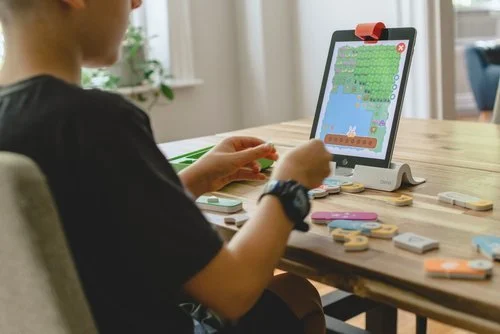How Do I Know if Online Therapy (Telehealth) is Right for My Child?
With the increased access to telehealth services, parents now have more options available to them when looking for a mental health provider to work with their child. Telehealth, however, won’t necessarily be a good fit for everyone. Within this post I hope to address any questions you may have in determining whether telehealth services will best meet the needs of your child.
To start, I think it is important to acknowledge that virtual schooling was challenging for many children and families. That said, I hope that this alone will not dissuade you and your family from accessing telehealth services. I think that it is important when thinking back to your child’s experience in virtual schooling mid-pandemic that telehealth is one-on-one. A more fitting comparison when considering telehealth is the use of videotelephony, like Facetime. How does your child engage during a Facetime call with someone they enjoy the company of? If they engage well, participate in fostering meaningful conversation, and can maintain their attention for an hour long- then telehealth may be right for them!
Your child’s therapist will meet them where they are developmentally. If your child still engages in imaginary play, their therapist will more than likely utilize play- and the communication that naturally occurs from it- to effect desired change. One of the many benefits to telehealth is the ability to meet the child in their most comfortable environment - home- while using their favorite toys. You may be thinking- toys?! Why would my child be playing with toys during their therapy session? When working with our youngest clients, therapists will engage them through play because it is the most natural way for them to share their experiences and feelings.
Through navigating the pandemic, therapists have built enormous toolboxes of virtual games, virtual crafting, literature read-alouds, and resources to make best use of a virtual platform. Card games are a favorite for many late elementary school-age to middle school-age children. They’re a great way to break the ice and engage in relationship building- so, we just engage in a card game virtually!
Telehealth may prove advantageous for you as a caregiver, as well. Telehealth removes the time commitment of commuting to and from in-person services. This eliminates additional time spent on the road while allowing you to engage in a broader array of personal or professional tasks during your child’s session times. Please keep in mind that consistent parent participation is expected within a child's time in therapy; meaning that a portion of your child’s session may be spent in communication with their therapist. That said- not all of every session will be that way! For more information on parent-therapist communication, please reference “How to Effectively Communicate with Your Child’s Mental Health Therapist.”
Telehealth can be a great platform for children and adolescents to receive therapeutic services. If you remain unsure, please consider reaching out to our office or a LifeSpring therapist for a consultation call to discuss your individual child and their needs. Just like all other elements of the therapeutic process- you and your child’s future therapist are a team and, in collaboration, can determine if telehealth is an appropriate fit for your child.
-
Frequently Asked Questions About Therapy for Children and Adolescents
How to Effectively Communicate with Your Child’s Mental Health Therapist
Signs and Symptoms That Indicate That Your Child May Be Experiencing Anxiety
What Every Child and Adolescent Therapist Wants Parents and Caregivers to Know
Listening Skills to Help Cultivate a Healthy Connection with Your Child
How to Use Questions to Build Engagement & Improve Communication
Search Our Other Blogs!
Interested in Counseling for Children & Teens?
If you’re a Marylander who knows that counseling is the direction you need to take, the therapists at LifeSpring Counseling Services are here to help. We offer online counseling services for mindfulness, depression, anxiety, trauma, and grief and loss. We also offer Brainspotting as a specialized service, and Brainspotting can be done online, too!
Here’s how you can get started! Online counseling for children and teens isn’t the only service offered at our Maryland office
The counselors and social workers at our Maryland office also offer counseling services for trauma, grief and loss, boundary setting, communication skills, and difficult life transitions. We also offer specialized counseling services including Brainspotting and spiritually-integrated counseling. Because we are located next to several local universities, we also work with college students and international students.
Written by: Caroline Masucci, LMSW
Caroline is a Licensed Master Social Worker (LMSW) at LifeSpring Counseling Services in Maryland, and she specializes in anxiety, depression, trauma, and communication skills. She works closely with children, teens, and adults.
Photo Credit: August de Richelieu & Julia M Cameron
Date of download: 10/17/2022


